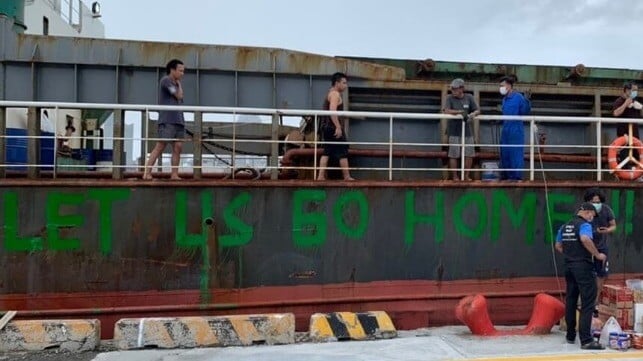ITF Reports “Disturbing Surge” in Seafarer Abandonment in 2025

The International Transport Workers’ Federation (ITF) released its latest tally on cases of seafarer abandonment, reporting what it called a “disturbing surge” in cases so far in 2025. The figures show an increase of a third over the record numbers reported in 2024, with the ITF demanding accountability.
The ITF is calling on international regulators, port states, and the International Maritime Organization to take urgent action. Under the law, it highlights that abandonment is clearly defined, with cases often involving seafarers being denied pay for two months or more, being left stranded, or left without food or medical support, or often a combination of these circumstances.
According to the report, over 2,280 seafarers have been abandoned aboard 222 vessels so far this year. It includes $13.1 million in unpaid wages. By comparison, the ITF says that at this point in 2024, there had been 172 cases involving 1,838 seafarers and $11.5 million in unpaid wages.
“Every single case of abandonment is a disgrace. It’s an intentional abuse of human rights, and the failure to end abandonment exposes a systemic problem in the maritime industry,” said Steve Trowsdale, the ITF’s Inspectorate Coordinator.
The labor organization highlights that 37 percent of the abandonment cases in 2025 have occurred in the Arab World closed followed by 34 percent that have taken place in Europe (the majority in Turkey). It says those rates are more than double the share of Asia Pacific, the next highest region.
“We are seeing a pattern of abuse that cannot be ignored and that must be confronted. In recent years, the Gulf region, and the UAE in particular, has seen a huge increase in seafarer abandonment cases. Both there and in Europe, much more must be done to crack down on the rogue shipowners who need to know there’ll be consequences,” said Trowsdale.
Lax enforcement of the rules, monitoring of the registry, and a lack of support from the sponsor countries are among the issues highlighted by the ITF. It asserts that the so-called “Flags of Convenience” system is central to the rise in abandonment cases. It specifically says it received 26 reports for vessels registered in St. Kitts & Nevis, another 26 for vessels registered in Tanzania, and 18 for Comoros, with the three jurisdictions dominating the abandonment lists. The ITF calculates that three-quarters of the reports came from the countries it labels as flags of convenience.
A lack of enforcement and responsiveness from flag and port states, the absence of adequate insurance for vessels, and shipowners refusing to accept responsibility for crew welfare are common factors that contribute to abandonment, says the ITF.
Member States at the International Maritime Organization have also raised concerns about the lax enforcement in some registries. In addition to the IMO’s efforts, the U.S. Federal Maritime Commission announced earlier this year it was launching an investigation into the practices of registry authorities. It also raised concerns about the unfavorable business conditions that the flags of convenience create and the potential impact on U.S. trade.
These flags have also become an increasing concern for their support of the shadow fleet of aging tankers. The EU launched a program of insurance checks for vessels sailing in Northern Europe and into the Baltic in response to the incidents and the fears of a major environmental disaster from the poorly supervised vessels.
